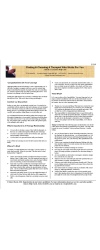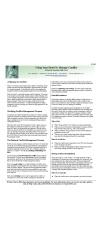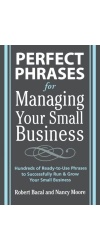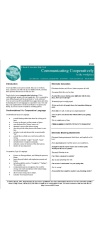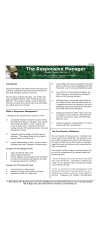Cooling off your anger will help you with conflict situations
About Managing Anger In Conflict: I’m Gettin’ Really Torqued! By Gene Simmons
Summary: A lighter but no less useful article on the process of managing anger. Cooling off your anger is often a first step in dealing with conflict more effectively, since an angry person usually does things that throw gasoline on the fire of conflict.
For those of you who have been living in a cave for most of your lives, you can translate the “torqued” in the heading of this article to “mad” or “angry”. For today’s discussion of anger, let’s quantify the intensity of our focus with the words “downright, PO’d!” I think that’s quite clear. Let’s proceed.
The first question is “What makes you really angry (as in PO’d)?”
Inconsiderate, rude people? Bad drivers? Lousy service? Brainless bosses? Dumb subordinates? Idiot lawyers? Answering machines? The government? Waiting in line? Foreigners? Big business? Potholes? Traffic jams? Airports? The news? TV programming? Your significant other? Your kids? Your neighbors? Uncle Harold? Aunt Edna? The stupid dog? The dumb car? The danged washing machine? Your lost keys? The toilet? The pillow? Your socks?
Wanna know what makes me really, really mad?
Nothing…
Hmmm, OK – how about what sometimes makes me upset and sort of irritated?
That would be me.
Huh?
Me. Just me. I’m the one who “makes” me upset and sort of irritated once in a while. I’m the only one who can “make” me do that. No one else, no event, no situation can make me get mad. Our anger doesn’t come from the outside. It can’t. It’s strictly an internal emotion that surges – and sometimes even erupts – as the result of our perception and feelings about an “outside” situation.
From the way it looks, we humans are probably designed and assembled with the brain wiring and foundation programming it takes to feel and express anger. Although experts disagree on the ability to logically differentiate between anger and distress in very young infants, we parents can all remember the early signals of displeasure to varying degrees in our youngin’s. Spitting the strained peas in Grandma’s face is a good example.
How did we learn how to be angry? From our exposure to anger around our humble abode and in the rest of our environment in our early years, we learned that getting hacked off is just what we humans do when we’re not pleased with a given situation. We learned that it’s OK – and sometimes even expected – that we make a yucky face, clench our fists, stomp our feet, beat on the table and scream obscenities at the top of our lungs (another strange expression that I suppose is not to be confused with using the middle or lower part of our lungs…our language is weird…). We learned – and duly programmed our subconscious – to react to the displeasing events in our lives with the appropriate (or for us personally – applicable) level and intensity of anger.
Guess what? It doesn’t need to be like that. We all have the ability to reprogram our little minds to respond to the displeasing events in our lives in a less stressful and much quieter manner. No, it’s not necessarily easy to do however, once we recognize and admit that our mega-anger is not something that is just normally a part of human nature – and that we do have the ability to consciously control it – we have completed a huge step in the right direction. Becoming hacked off is an automatic decision our minds make for us. Not becoming angry then, must be a conscious decision we make that will override our automatic one.
You might try this. The next time you feel the anger starting to surge, take just a couple of seconds – or a few minutes or longer – to realize what is happening, think briefly about the event or person who is triggering the anger, then decide if you really want to let your subconscious continue on it’s programmed path – or if you want to consciously step in and modify this effort. Anger toward a person or situation can be expressed assertively – not aggressively – at a reasonable volume while being respectful of the rights and opinions of others. This can lead to open communications and a resolution of the problem. Will it? Who knows but it’s worth a shot. Sure beats knocking somebody’s skull in.
In the cooling-off period, you might just discover that the situation was not nearly as critical as you had first imagined. Perhaps someone (maybe you?) didn’t have all the facts and the conflict was the just result of a misunderstanding. Maybe once you stand back and see the circumstances from a slightly different perspective, you might decide the whole thing was pretty silly to start with and there is nothing really worth pursuing. Or, you may even admit that entire situation was completely out of your control (influence) so getting angry is just a futile waste of energy.
Probably the worst thing anyone could do is suppress the anger. To tuck it away deep down inside. This could lead to major problems later either in a potential catastrophic confrontation, in a “torpedoing” of the other person – or in an eating away of your mental/emotional stability or deterioration of your physical being. Not a good thing to have happen.
Anger toward an object (car, refrigerator, keys) is pretty much a waste of effort and energy. It’s likely a situation (danged car broke and I don’t have the coins to fix it) or ourselves (I don’t know how to fix the danged car) that we’re angry at. Stuff happens – and sometimes we even help it happen by ignoring signals that sooner or later we’ll need to do something to take care of an impending problem. So now it’s “later” – and we need to fix something.
Anger, at a considerably lower intensity than downright PO’d, can be beneficial in that it can help us identify situations that we might want to address – either in an external situation or within ourselves. Anger is not all as bad as some folks would lead us to believe. The important thing is that we recognize its source (that’d be us) and take whatever steps are needed to bring it back under our conscious control. This includes professional counseling if necessary.
Life’s too short to for us to eat up a bunch of time being angry. Why don’t we all just have a super-duper triple sized banana split instead? Just a thought…
About The Author
Gene, through NuPathz.com, provides an easy reading self-help blog along with affordable books and materials written to help folks find the road to a more enjoyable lifestyle, to pass on some of life’s “secrets for survival” in a chaotic world & offer a few smiles along the way. It’s a down-to-earth, simple approach to discovering a better life. You can visit Gene at http://www.nupathz.com/

